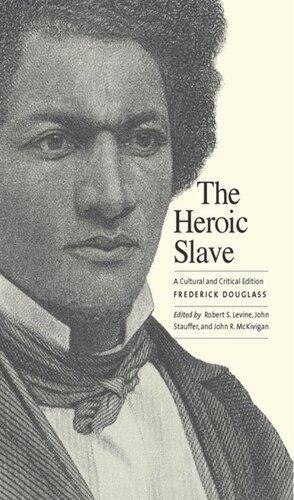(Ebook PDF) The Heroic Slave A Cultural and Critical 1st Edition by Frederick Douglass, John Kaufman McKivigan, Robert Levine, John Stauffer ISBN 030018462X 9780300184624 Full chapter
$50.00 Original price was: $50.00.$35.00Current price is: $35.00.
The Heroic Slave A Cultural and Critical 1st Edition by Frederick Douglass, John R. Kaufman-McKivigan, Robert S. Levine, John Stauffer – Ebook PDF Instant Download/Delivery: 030018462X, 978-0300184624
Full dowload The Heroic Slave A Cultural and Critical 1st Edition after payment

Product details:
ISBN 10: 030018462X
ISBN 13: 978-0300184624
Author: Frederick Douglass, John R. Kaufman-McKivigan, Robert S. Levine, John Stauffer
First published nearly a decade prior to the Civil War, The Heroic Slave is the only fictional work by abolitionist, orator, author, and social reformer Frederick Douglass, himself a former slave. It is inspired by the true story of Madison Washington, who, along with eighteen others, took control of the slave ship Creole in November 1841 and sailed it to Nassau in the British colony of the Bahamas, where they could live free. This new critical edition, ideal for classroom use, includes the full text of Douglass’s fictional recounting of the most successful slave revolt in American history, as well as an interpretive introduction; excerpts from Douglass’s correspondence, speeches, and editorials; short selections by other writers on the Creole rebellion; and recent criticism on the novella.
The Heroic Slave A Cultural and Critical 1st Table of contents:
Part 1: The Text of Frederick Douglass’s The Heroic Slave
- Frederick Douglass, The Heroic Slave
- A Note on the Text
Part 2: Contemporary Responses to the Creole Rebellion, 1841–1843
- “Another Amistad Case? What Will Grow Out of It?”
- “The Creole Mutiny”
- Protest of the Officers and Crew of the American Brig Creole
- “The Hero Mutineers”
- Deposition of William H. Merritt
- “Madison Washington: Another Chapter in His History”
- Daniel Webster, Letter to Edward Everett
- William Ellery Channing, from The Duty of the Free States, or Remarks Suggested by the Case of the Creole
- Joshua R. Giddings, Resolutions
- Henry Highland Garnet, from “An Address to the Slaves of the United States of America”
Part 3: Douglass on the Creole and Black Revolution
- Frederick Douglass, from “American Prejudice against Color”
- Frederick Douglass, from “America’s Compromise with Slavery and the Abolitionists’ Work”
- Frederick Douglass, from “American and Scottish Prejudice against the Slave”
- Frederick Douglass, from “Meeting in Faneuil Hall”
- Frederick Douglass, from “Address at the Great Anti-Colonization Meeting in New York”
- Frederick Douglass, from “What to the Slave is the Fourth of July?”
- Frederick Douglass, from “West India Emancipation”
- Frederick Douglass, “A Black Hero”
Part 4: Narratives of the Creole Rebellion, 1855–1901
- William C. Nell, “Madison Washington”
- Samuel Ringgold Ward, “Men and Women of Mark”
- William Wells Brown, “Slave Revolt at Sea”
- Lydia Maria Child, “Madison Washington”
- Robert Purvis, “A Priceless Picture: History of Sinque, the Hero of the Amistad”
- Pauline E. Hopkins, “A Dash for Liberty”
Part 5: Criticism
- Robert B. Stepto, from “Storytelling in Early Afro-American Fiction”
- William L. Andrews, from “The Novelization of Voice in Early African American Narrative”
- Richard Yarborough, from “Race, Violence, and Manhood”
- Maggie Montesinos Sale, from “The Heroic Slave”
- Celeste-Marie Bernier, from “‘Arms like Polished Iron'”
- Ivy G. Wilson, from “Transnationalism, Frederick Douglass, and ‘The Heroic Slave'”
- Carrie Hyde, from “The Climates of Liberty”
People also search for The Heroic Slave A Cultural and Critical 1st:
what were some key elements of slave culture
the heroic slave frederick douglass
slaves in viking society
the heroic slave frederick douglass pdf
what is the heroic slave about
5 social hierarchy groups of the antebellum south
Tags:
Frederick Douglass,John Kaufman McKivigan,Robert Levine,John Stauffer,Heroic Slave,Cultural,Critical 1st


